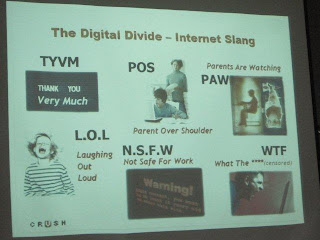Do we know what games they are playing? How much do we understand about online games? Have we ever heard of the popular online game called War Craft?
Online games are more often than not, team games, whereby 'gamers' log onto the game and form teams, with a purpose to defeat a common enemy (as in War Craft or Maplestory) or to take care of a family or community (as in SIMs). If your child were to pull-out midway of the 'mission', his whole team may lose the war (as in War Craft) and when he gets back to school the next day, his online team-mates (usually school-mates) would blame him for causing their team's defeat. This situation may cause a loss of friends.
The Cyberwellness Talk, held at AMK Presbyterian Church, on Sat 10th Apr, provided a good insight to the Cyberworld.
Let us first understand the "spheres" or circles, within which we interact according to our age. For example:
- Up to age 10 years : play PSP (Play Station) -> type of games: virtual trading of items
- From 11 - 20 years : join online game communites -> play Multi-Media Online Games (eg Maplestory) -> via Blogs or YouTube.
- From 21 - 30 years : join LAN communites -> play LAN games -> via Instant messaging/Forums.
- From 31 - 40 years : join Café communities -> use Console -> World-Wide Web.
- From 41 and above : use only Email
Much has been said on the dangers of the Internet gaming. Certain behavorial indicators to look out are:
- Schoolwork suffered as too much time has been spent on playing computer games.
- Child becoming restless or irritable when parent tried to reduce or restrict his gaming activities.
- Missed studies or CCA to play more computer games.
- Lied about his time spent on computer games.
- Spend increasingly more time and money in order to maintain the same level of thrill and excitement.
- Playing computer games is used a a form of escape from problems or stress.
- Child's mind becoming excessively focused on computer games.
- Resorted to stealing or borrowing money from family or friends in order to buy computer games from store or visitng the "internet-cafe".
 The key distinguishing feature of these Multi-Media Online Games is that the Game Never Ends! One can play forever! This is because all games push you to better yourself, to attain a higher level or to acquire more and more riches. And it is in this drive to achieve this goal that the game becomes an addiction for the child.
The key distinguishing feature of these Multi-Media Online Games is that the Game Never Ends! One can play forever! This is because all games push you to better yourself, to attain a higher level or to acquire more and more riches. And it is in this drive to achieve this goal that the game becomes an addiction for the child.Parents must also be aware of the different Video Game classifications i.e. Adult Themes, Violence levels, Sex and Nudity, Language and Drug Use. For example, parents have to be careful that our child do not play games that contain too realistic depiction of violence for his age, or encourages sadistic (eg Grand Theft Auto) or sexual violence.
Secondly, we have to raise resilient kids. What does this mean?
Dos :
- We have to discover their talents and nurture them.
- We introduce them to real-world activities, eg out-door activities.
- Avoid using computer games to "nanny" them. In other words, avoid using computer games to occupy them.
- Avoid positioning gaming as "reward". This means using computer games as reward.
- We decide on the kind of games.
- We choose the right season, e.g. after homework is completed or after the exams.
- All homework to be completed before gaming.
- No gaming after 10.30 pm during school weekdays, Monday to Thursday.
- Always ask parent permission to play.
- Stop playing within 5 minutes when asked to do so.
- No gaming at all during exam period.
- Bad results will mean less playing-time during school holidays.
- Always put family members first in priority to play with. Co-operative games over one-person games.
- Never chat with anyone you do not know on the internet.
- Games must be approved by parents. Parents have the right to ban any games not appropriate.
- Gaming is not a MUST. It is a privilege givern by parents and can be taken away.
Consequences of breaking rules include confiscation of gaming consoles or locking of computers.
We have to be involved in the Internet activities of our children:
- Maintain a close communication with our child : find out how is he doing on the Internet.
- Set rules and guildelines : eg not to provide personal details to "friends" on the Internet.
- Place the computer in an open area : so as to discourage inappropriate Internet surfing.
- Get to know your child's Internet friends : Be friendly and approachable.
- Make a police report : if you feel that your child is in danger, or if your child is fearful (eg in case of "cyber-bullying")
On a personal note:
Parents cannot forbid our children from entering into the Cyberworld as the Internet is here to stay and is integral to our lives. We can only prepare ourselves and teach our children to be Cyber-wise, to moderate themselves on internet-gaming, and to impress on them that there are much more to life outside the computer. There is greater joy to experience. One only has to go outdoors and meet people face-to-face, rather than meeting them in "cyber-face".






